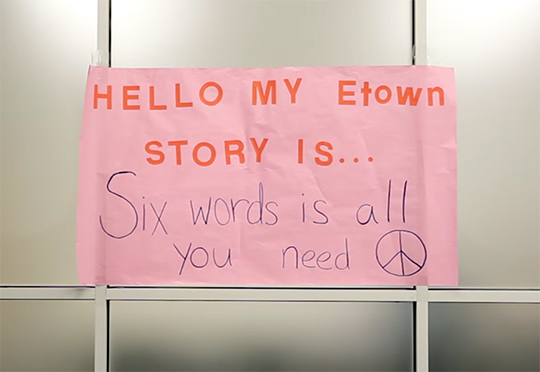Richard Newton, assistant professor of Religious Studies at Elizabethtown College, looks at conversations on race, diversity and differences as ways to ‘pay forward’ inspiration.
In 2015 the professor introduced six-word stories after being motivated by the Race Card Project, an endeavor of NPR’s Michelle Norris. The E-town version of these stories created an on-campus venue to honestly express thoughts, concerns and experiences about race and diversity.
Last spring, dry-erase boards were set up across campus to record personal stories, and paper submissions were requested. The stories were short. Six-words, to be exact. In the end, Newton and students in his Religion 101: Signifying Religion: An African American Worldview class gathered more than 500 narratives and created a fair where the thoughts could be shared.
But, at Elizabethtown College discussions of diversity are not simply projects that are pushed through and then discarded, said Newton. They are a movement to push the campus community toward an genuine understanding of our differences. So he asked, “what should the next six words on race be at the college?”
Our generation is one that is going to make a difference.”
This semester his Religion 101 students took six-word stories to the next level by interviewing others on camera. They set up outside the Jay’s Nest and asked fellow Blue Jays to participate. “It helped them work on their ethnography skills,” Newton said. “Why do people feel uncomfortable when their faces are associated with their words?”
And, he said, it helped the College learn what needs to be done to help make campus inclusive for everyone.
Miriam Balasundram said she wishes all students would take Religion 101 so they are forced to look at diversity. “Minimally we learn of other races and cultures in elementary school,” but there is little shared knowledge after that.
The senior biology pre-med student said experiences like these help start a dialogue with her peers. “Our generation is one that is going to make a difference.”
In the interviews Balasundram said, some students “were raw with their answers, very unabated about what they felt about race.”
This honesty, however, has helped Balasundram live her life more consciously, more inclusively, she said. It will help her after graduation, also, as she becomes a doctor in rural areas of the United States where people can’t be easily reached.
The College’s motto depends on open discussions such as these, said Newton “It’s not easy, but it’s especially necessary. We can’t censor these stories.”


